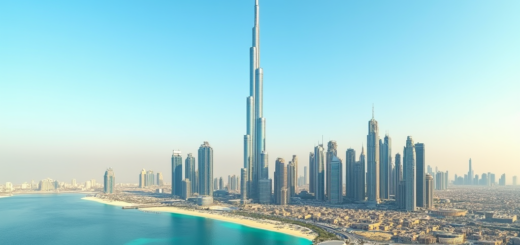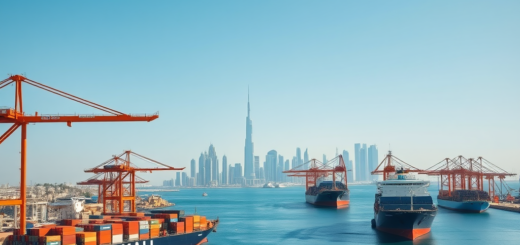Dubai Mainland vs Free Zone: Which is Best for Your Business?
Dubai Mainland refers to the areas of Dubai that fall outside the jurisdiction of Free Zones and are regulated by the Department of Economic Development (DED). One of the key characteristics of the Mainland setup is the need for a local sponsor who owns 51% of the business in many cases. However, certain sectors allow for full foreign ownership. Dubai Mainland is ideal for businesses planning to operate within the local UAE market without restrictions.
Dubai Free Zones
Dubai Free Zones are specialized regions that offer incentives like 100% foreign ownership, tax exemptions, and simplified procedures for business setup in Dubai. Prominent Free Zones include Jebel Ali Free Zone (JAFZA), Dubai Multi Commodities Centre (DMCC), and Dubai Internet City. Free Zones are often designed to attract specific industry sectors like technology, finance, and logistics, making them an ideal choice for businesses in these areas. However, trading directly in the UAE market from a Free Zone is restricted.
Key Differences Between Dubai Mainland and Free Zones
Ownership Structure
One significant difference between the Mainland and Free Zones is foreign ownership. In the Mainland, a local sponsor is generally required to hold 51% ownership, although 100% ownership is permitted in certain business activities. In contrast, Free Zones allow 100% foreign ownership, which is a major advantage for international investors looking for complete control over their business.
Business Scope and Activities
Businesses in the Dubai Mainland have the freedom to operate anywhere within the UAE, giving them access to a wider market. On the other hand, Free Zone companies are typically restricted from conducting business directly with the Dubai Mainland market unless they appoint a local distributor or agent. This restriction can be a crucial factor depending on your business model and market reach.
Office Space and Leasing
In Dubai Mainland, there is considerable flexibility in choosing office space according to your business needs, whether it’s a shared office, a retail shop, or a warehouse. Free Zones have specific regulations requiring businesses to lease physical office space within the zone. This can be an additional cost for startups and small enterprises.
Legal Framework and Policies
Mainland businesses fall under the purview of UAE Federal Laws and are regulated by the Department of Economic Development (DED). On the other hand, Free Zones have their own independent regulatory authorities and policies, which can sometimes simplify business operations. Understanding the legal framework of each jurisdiction is crucial for compliance and smooth business operations.
Key Financial Considerations
Licensing and Registration Fees
The cost of setting up a business in Dubai varies significantly between the Mainland and Free Zones. Below is a comparison table to give you an idea of the financial differences:
| Criteria | Dubai Mainland | Dubai Free Zones |
|---|---|---|
| Setup Cost | Medium to High | Varies by Free Zone |
| Annual License Fees | Variable | Fixed |
| Office Space | Flexible | Mandatory within Zone |
| Foreign Ownership | 51% Local Sponsor | 100% Foreign Ownership |
Taxation and Other Financial Obligations
One of the attractive aspects of setting up a business in Dubai Free Zones is the tax exemptions. Free Zone businesses are exempt from corporate tax for a specific period and enjoy various other incentives. Mainland businesses, however, are subject to UAE corporate tax and VAT, although the VAT is relatively low at 5%. Understanding these financial obligations is crucial for budgeting and financial planning.
Pros and Cons
Dubai Mainland
When considering a business setup in Dubai Mainland, it’s essential to weigh the pros and cons carefully:
- Advantages: Access to the broader UAE market, flexibility in business activities, and potential to employ a larger workforce.
- Disadvantages: Requirements for a local sponsor, higher setup costs, and compliance with various regulations and taxes.
Dubai Free Zones
On the other hand, Free Zones offer a different set of advantages and challenges:
- Advantages: 100% foreign ownership, tax exemptions, simplified and quicker setup procedures, and specialized business environments.
- Disadvantages: Restrictions on trading within the UAE market, mandatory office space within the zone, and a generally higher cost of operation in specific zones.

Making the Decision
Assessing Your Business Needs
Deciding between Dubai Mainland and Free Zones largely depends on your specific business needs and goals. Here are some factors to consider:
- Market Access: If your business requires unfettered access to the UAE market, Mainland could be the better option.
- Ownership Structure: If retaining full control over your business is crucial, then setting up in a Free Zone might be more suitable.
- Financial Capacity: Evaluate your budget since the cost of setting up in Mainland and Free Zones can vary significantly.
- Business Type: Some Free Zones are specialized for specific industries, making them an ideal choice for businesses in those sectors.
- Regulatory Environment: Consider the compliance and legal requirements in both jurisdictions to ensure your business meets all regulations.
Consulting with Experts
Given the complexities and nuances of setting up a business in Dubai, consulting with experts can provide invaluable insights. Many firms specialize in helping businesses navigate the regulatory landscape, offering services from initial setup to ongoing compliance and advisory support. These resources can simplify decision-making and ensure that your business setup is smooth and hassle-free.
conclusion
Choosing between Dubai Mainland and Free Zones depends heavily on your business goals, budget, and operational needs. The Mainland offers greater market access and flexibility, while Free Zones provide significant advantages like 100% foreign ownership and tax exemptions. Carefully assess your business requirements and consult with experts to make an informed decision that will set the foundation for your success in Dubai.
Часто задаваемые вопросы
Can a Free Zone company trade within Dubai Mainland?
Free Zone companies can trade within the Dubai Mainland only through a local distributor or agent, as direct trading is restricted.
Are there any restrictions on the type of business activities in Free Zones?
Yes, each Free Zone has specific business activities that are allowed. It’s important to verify the suitability of the Free Zone for the intended business activity.
Can a Mainland company open branches in Free Zones?
Yes, a Mainland company can open branches in Free Zones. However, it must comply with the regulations of both jurisdictions.
Do Free Zone companies have to pay VAT?
Depending on the business activities and trade within the UAE, Free Zone companies might be required to register for VAT and comply with UAE VAT laws.
Is there a difference in ease of obtaining a business license in Mainland vs. Free Zones?
Generally, obtaining a business license in a Free Zone is quicker and involves simpler procedures compared to the Mainland, which often requires more approvals and documentation.


